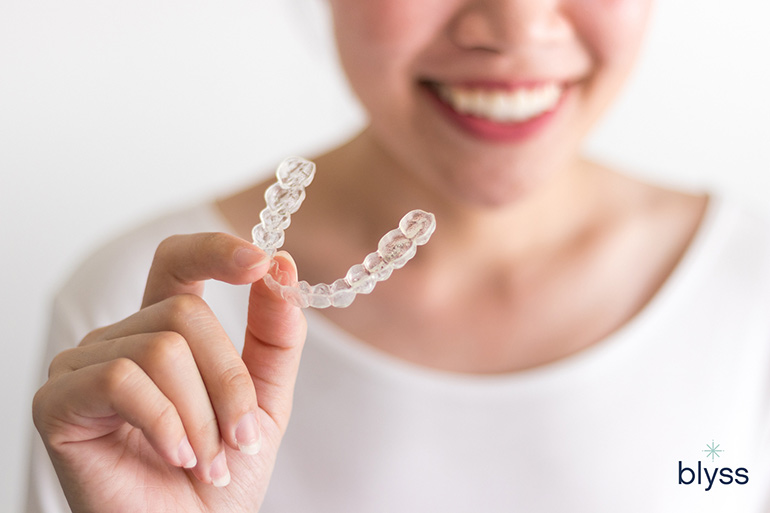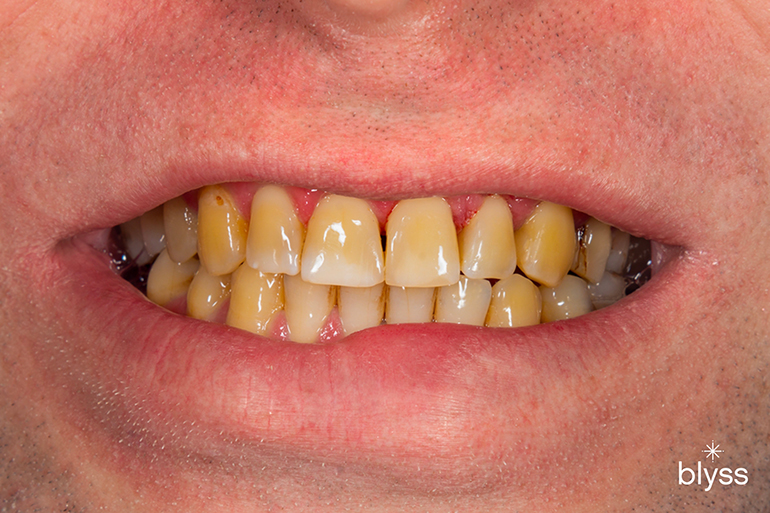Most people search for “cheap dental implants” or “affordable dental implants”. Unfortunately, dental implants are never cheap. How much do dental implants cost?
To give you an idea, one dental implant – including the crown – ranges between $3,000 to $7,000 in the US. That is just to replace a single tooth! Now, if you need a full mouth of dental implants, you can pay anywhere from $25,000 to a staggering $80,000!
That big of an amount can hurt your budget. But, you can potentially save up to $20,000 on your total cost if you know how to navigate the whole dental implant process.
“Savings” does not necessarily mean getting the lowest price for something.
Here at Blyss Dental, we always aim at guiding our patients in Del Mar, California, and San Diego to really get the most value out of their money. That, for us, is real savings!
In this article, we will provide tips and insider information about teeth implants. We divided the article into three parts:
- Part 1. Top 5 Common Complaints from Patients About Dental Implant Cost
- Part 2. Top 8 Factors Affecting the Cost of Dental Implants
- Part 3. Top 7 Tips to Save on Your Dental Implant Cost
Read on to know more about this important insider information and tips about dental implants.
Part 1. Top 5 Common Complaints About Dental Implant Cost
Getting dental implants is not a joke. It is very common for patients to get frustrated about the whole process, especially when it comes to the price they have to pay for the treatment.
In this part of the article, we outlined the five most common complaints that we hear from patients about teeth implants. Knowing these grievances can help you avoid them in your own dental implant journey.
Complaint 1. “Prices of dental implants are not posted online.”
Fact: It is difficult to scour dental implant prices online among dentists near you. This makes it hard for patients to really shop around and compare prices.
Since there are no standard prices, two dental offices within the same town may have a huge difference in price for the same dental implant work. The cost may also vary as much as 100% from practice to practice.
Usually, you can only know the dental implant cost after you visit your dentist for a consultation. Yes, your local dentist needs to see you first for a consultation to look at your current condition and bone structure. Then, the dentist can make the right recommendations with the exact pricing and procedures.
However, you have to pay for the consultation. Initial Consultations for dental implants can cost between $150 to $350. Often, you also need to pay for a CT Scan which costs around $350 to $600. CT Scans are the type of X-rays required to diagnose and perform dental implant surgeries.
After paying, shopping with more consultations from other implant dentists can really add up. Most just go ahead with their first dentist without evaluating other options.
Here at Blyss Dental, we believe that you should be able to make an informed decision. So, it is absolutely helpful to know the estimated prices of dental implants from the very beginning. When you know the dental implant cost from the start, you can really prepare yourself.
Below are the average prices for dental implants in the US:
Average Dental Implant Cost in the US
| American Dentist Prices | Low | Average | High |
|---|---|---|---|
| Dental Implant (excluding crown) | $1,200 | $1,800 | $2,700 |
| Dental Implant with Crown | $2,200 | $3,700 | $6,000 |
| 3 Unit Bridge with Dental Implants | $5,900 | $8,700 | $13,500 |
| Dentures with 4 Implants | $10,000 | $15,000 | $21,000 |
| All on 4 Dental Implants | $15,000 | $25,000 | $35,000 |
| Full Upper or Lower Fixed Hybrid Bridge with 6 Implants | $22,000 | $32,000 | $40,000 |
You can explore Blyss Dental’s dental implant pricing here.
Complaint 2. “The advertised price did not include the teeth.”
Imagine this: you were driving around and saw a billboard offering a discounted price of $1200 per dental implant. You visited that dental office and asked about the ad. The dental office assured you that the price is really $1200. You agreed to go ahead with the treatment.
You paid for the consultation, the CT scan, and all the other preparatory procedures. The dentist then asked what material to use for the crowns. You asked, “What crowns?” The dentist explains that it is the actual tooth that will be placed on top of the implant and it costs another $2000 (or more depending on the material).
This happens often. Most people think that when you say dental implants, they already include everything. To clarify, there are actually three components in dental implants: the implant, the abutment, and the crown.
The implant is the titanium post that is screwed under the gums. The abutment is what connects the implant post with the crown. The crown is the tooth, the part that you chew with and see in your mouth.
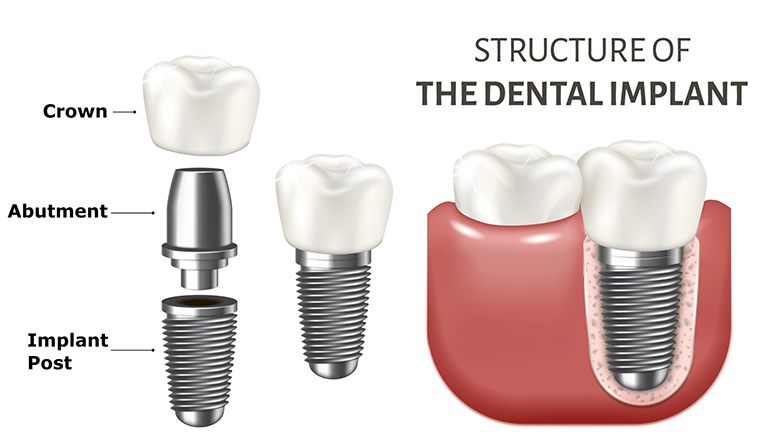
Dental implants have three components – the implant post, abutment, and crown. Make sure that these components are included in your treatment plan.
Now, you don’t want to pay for something without knowing the full amount. So make sure you know the full price to avoid going home with partially completed implants or just paying the full price outside your budget.
Ask for the full cost of tooth replacement from start to finish. Make sure the treatment plan cost you get includes the implants, the abutments, and the crowns.
Dental Implant Cost Tip:
When you see an ad that says “Price of Dental Implant”, assume it doesn’t include the tooth. See the following examples:
| Advertised “Dental Implant Cost” | Non Advertised Price of Tooth / Teeth plus other procedures | Total Cost | |
|---|---|---|---|
| Single Tooth Implant | $1500 | $2000 | $3500 |
| All on 4 Implants | $14000 | $10000 | $24000 |
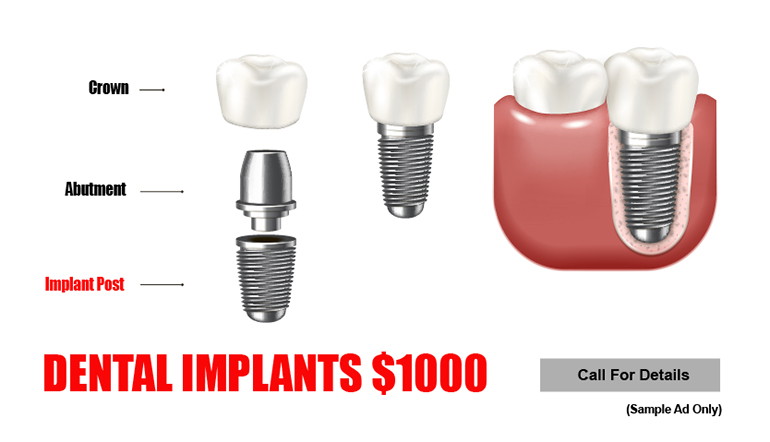
In this sample advertisement, the price posted is only for the implant post. It’s designed to appear as a low-cost tooth replacement price. But it’s only half the cost. It excludes the cost of the abutment and the crown which accounts for 50-70% of the total dental implant cost.
Complaint 3. “I’m only given the All-on-4 option.”
All-on-4 Dental Implants, often called “teeth in a day”, is a dental implant treatment where the dentist can replace all your teeth with an implant-attached prosthesis in one surgery. With this treatment, you don’t need to wear removable dentures during the usual three-month interim healing process.
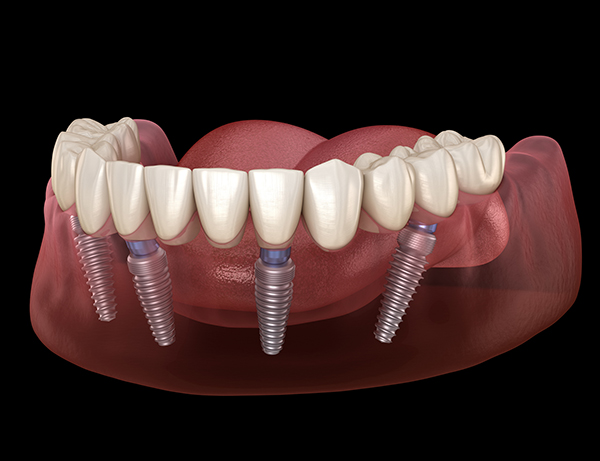
All-on-4 implants are just one of the options for teeth replacement but it is not suitable for everybody.
The catch, however, is that teeth-in-a-day is only suitable for a narrow group of patients. You need very good bone in your front jaw for the implants to hold the denture. The cost of this procedure is high: between $40,000 and $60,000 (for a full set of top and bottom teeth).
Know that there are other options for full arch teeth replacement that may be better for you. Ask about fixed bridge hybrids, fixed zirconia bridges, or the newer fixed pekkton bridge.
A good dental practice should give you all these options depending on your case, age, lifestyle, or health. Remember, getting the most appropriate treatment can give you more savings than settling on just the option given to you.
The following table outlines the average cost of full mouth restoration with implants. This includes the total cost of restoring the upper and lower arch with implants.
Full Mouth Dental Implant Cost
| Snap on Dentures (removable teeth) | $30,000 |
| All on 4 Dental Implants (fixed teeth) | $55,000 |
| Full Hybrid Bridge Secured with 6 Implants (fixed teeth) | $62,000 |
| Full Zirconia Bridge with 6 Implants (fixed teeth) | $68,000 |
| Full Pekkton Bridge with 6 Implants (fixed teeth) | $68,000 |
Complaint 4. “I was asked to pay upfront for the total cost.”
Paying upfront for the entire dental implant cost is not advisable. Once you’ve shelled out a chunk of your savings, evaluating other options will be out of the picture and you’ll be left hoping that the treatment will go as planned.
What happens if you’re not happy with the first few stages of the treatment? You may find it difficult to get a refund for what you prepaid. The best way is to pay for the procedure as you get them during each stage of the treatment.
If you are getting only extractions and bone grafting in the first stage, just pay the cost of extractions and grafting. If you went ahead with the surgery and implant post-installation, pay for it when you have the work done. Then, pay the rest after the teeth are installed.
Paying the entire cost upfront can leave you vulnerable in getting the dental implant treatment that you deserve. It’s important for you to be aware of the costs you will pay with each stage of the process of the implant procedure.
Below is a table showing the average cost per stage of the whole dental implant procedure:
Single Tooth Implant Cost By Treatment Stage
| without tooth extraction | Healing wait time before the next stage | Average Cost |
|---|---|---|
| First stage: Implant post installation | 3-4 months | $1,800 |
| Second stage: Implant crown installation | $1,900 | |
| With tooth extraction and bone grafting | Healing wait time before the next stage | Average Cost |
| First stage: Tooth extraction and bone grafting | 3-4 months | $935 |
| Second stage: Implant post installation | 3-4 months | $1,800 |
| Third stage: Implant crown installation | $1,900 |
Complaint 5. “I wasn’t told about other required procedures.”
Before getting any treatment, dentists usually recommend other procedures that you need for the treatment to be successful. But, many patients get frustrated because these procedures are often not included in the advertised price.

A great and caring dentist explains everything upfront including all the procedures required before and after getting dental implants
This, in turn, affects the total dental implant cost patients have to pay. Ideally, you have to know what services you’ll need before (and after) the dental implant treatment. This can help you prepare for a major expense such as dental implants.
In addition to the actual implants, you may be charged for an initial consultation, CT scans, surgical extraction, bone grafting, temporary prosthesis, sedation, sinus lifts, and more.
To help you prepare, below are the average costs of these prerequisite procedures:
Dental Implant Preparatory Procedures Cost
| Initial Consultation | $250 |
| CT Scan | $380 |
| Temporary Denture (full arch implants) | $700 |
| Simple Extractions | $185 |
| Surgical Extraction | $350 |
| Bone Grafting | $500 - $900 |
| Block Grafting | $2,500 - $4,200 |
| Surgical Guide | $900 |
| IV sedation | $1,200 |
| Sinus Lift | $2,500 |
Here at Blyss Dental, we offer a free consultations for our patients. If you are in Del Mar, California, and are looking for dental implants, take this opportunity to book a complimentary appointment with us.
Part 2. Top 8 Factors Affecting Dental Implant Cost
Many of us find the idea of getting tooth implants overwhelming. Dental implants are a big expense. And let’s face it, surgery is never fun. This section is a comprehensive but simple guide to help you plan and budget for dental implants.
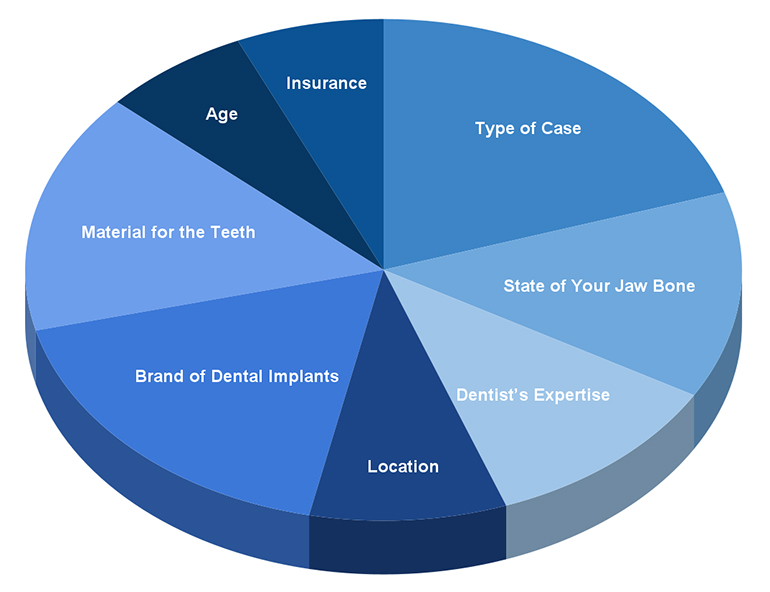
We outlined below the top factors that affect the total dental implant cost to help you make smart decisions about your choice of dentist and treatment.
Price Factor 1. What Type of Case You Have
Just like any other dental treatment, the total dental implant cost primarily depends on what type of work you need to be done on your teeth. Knowing your case from the very beginning can help you estimate your cost and choose among your local dentist options.
So the first question you have to ask is, “What case do I have?”
Below is a simple guide to give you an idea of the total cost you have to pay for your dental implants depending on your case.
Case 1: Do you need to replace a missing tooth? Or do you need to replace a tooth that needs to be extracted?
You’ll need single-tooth dental implants. In this situation, you have to budget for the cost of all three components of a tooth replacement: the titanium implant post, abutment, and crown.
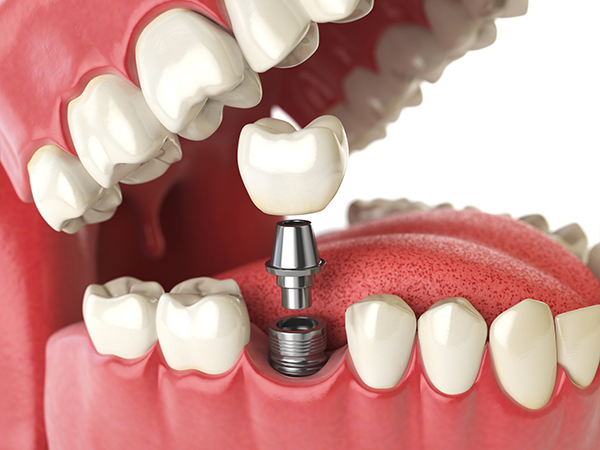
The cost of a single tooth implant should include the cost of the abutment and the crown.
Cost Breakdown of Single Tooth Implants
| Single Tooth Implant Cost Breakdown | Average Cost |
|---|---|
| Titanium Implant Post (This is the “screw” the goes underneath your gums) | $1,800 |
| Abutment (This connects the post with the crown) | $700 |
| Implant Crown (The tooth the goes on top of the abutment) | $1,200 |
| Total Tooth Replacement Cost | $3,700 |
Case 2: Do you need to replace multiple missing teeth?
Instead of getting removable partials, you get implant-supported fixed bridges. Here’s a guide on the cost of a dental implant bridge to replace two or more adjacent missing teeth:
Cost to Dental Implant Bridges
| Implant Bridge Type | Average Cost |
|---|---|
| 3-unit bridge (2 implants, 1 pontic) | $8,600 |
| 4-unit bridge (3 implants and 1 pontic) | $12,300 |
| 6-unit bridge (3 implants and 3 pontics) | $14,700 |
| 8-unit bridge (4 implants and 4 pontics) | $19,600 |
Case 3: Do you need to replace all of your upper or lower teeth? Are you currently wearing removable dentures that you can’t stand? Do you want to extract all your remaining teeth and start over?
Modern dentistry has a few full-mouth dental implant solutions to replace your teeth. The trick is not to get fixated on one solution. You should consider all of your options. Here are the different types of full-mouth implant replacements available today.
Full Upper or Lower Dental Implant Procedure Prices
| Upper or Lower Implants Cost | Per Arch | Full Top and Bottom Arch |
|---|---|---|
| Implant Dentures / Overdentures | $15,000 | $30,000 |
| Fixed Hybrid Bridge (6 implants) | $32,000 | $64,000 |
| All on 4 Dental Implants | $25,000 | $50,000 |
| Fixed Zirconia Bridge (6 implants) | $37,000 | $74,000 |
| Fixed Pekkton Bridge (6 implants) | $37,000 | $74,000 |
Price Factor 2. Do You Have a Good Jaw Bone?
Your bone structure affects the total cost of your dental implant treatment. The state of your jawbone affects what type of implant procedure can be done and the number of dental implants you can install per jaw.
When you lose a tooth, the bone starts to recede. It recedes up to 30% during the first year, and it continues to decline after that. Preserving your jawbone is vital, not only for the health of your teeth but for your facial structure.
Here are common factors contributing to bone loss:
- Extraction of teeth
- Systemic diseases
- Side effects of certain medications
- Unbalanced bite, or lack of proper occlusion
- Poor oral hygiene, leading to periodontal disease
In cases where the jaw bone has a significant amount of recession, you may have to add the cost of bone grafting to the total dental implant cost. Extensive rebuilding of your jawbone can be pricey, especially if you have to see a Periodontist or Oral and Maxillofacial Surgeon.
Price Factor 3. Your Dentist’s Level of Expertise
Some dentists finish dental school without training in dental implant installation. It’s not part of the standard curriculum and it takes extra (and expensive) training to learn these skills.

Choosing a well-experienced dentist to do your dental implants is a key factor for your treatment’s success.
However, even for those with the training, it takes time and experience to jump from Level 1 implant procedures to more complex cases such as front teeth or full mouth implants.
The level of training and experience can affect the cost of dental implants. The more training and experience a doctor has, the more they can charge. But, the success rate is also higher when your dentist has sufficient training and experience. Paying extra for a highly experienced and trained dentist can actually give you more savings in the long run.
Price Factor 4. Your Location
Dentists tend to price their procedures close to the average in their location. If you live in an affluent neighborhood with a high cost of living, expect to pay a premium for any dental services.
Full-mouth dental implants can cost up to $90,000 in an expensive city such as Beverly Hills or New York.
Dentists in these areas have higher overheads – staff salaries are higher, as is the cost of real estate and property taxes. Dentists also choose their locations based on their preferred price positioning – low, mid, or high.
But you don’t have to limit yourself to the dentist down the road. There’s no reason why you shouldn’t shop around beyond your immediate proximity. Search adjacent cities, or even states.
Price Factor 5. Brand of Dental Implants
The best implant dentists in your area use top implant brands. The quality of dental implants is one of the most important factors in the short- and long-term success of your teeth restoration.
Top implant brands such as Straumann or Nobel Biocare cost an extra $200 – $700 per implant. But as you’ll see, investing in reputable brands for your implants is ultimately worth the extra expense for multiple reasons.
Here are some top implant brands:
- Straumann
- Nobel Biocare
- BioHorizons
- Neodent by Straumann
- MIS Implants
- Bicon
Be careful of cheap dental implant promotional prices you see on ads and billboards. Unless stated, they may be using generic and less-known implant brands. Remember: You get what you pay for. Choosing cheaper materials for a lower price can actually easily double or triple your price to repair.
There are plenty of inexpensive brands, which have a little track record and the risk of going out of business. You may be left with no replacement parts if something happens to your implants in the future. Make sure to always ask your dentist about the brand of the implant components.
Price Factor 6. Quality of Material Used for the Teeth
The material of the crown will also affect the total dental implant cost. Your choice will also affect the aesthetics, strength, and longevity of your teeth replacement.
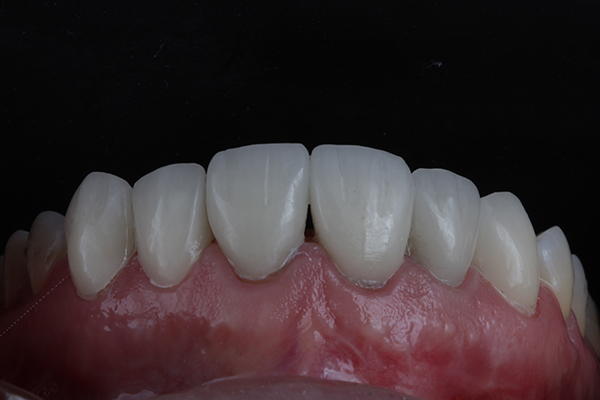
The type and quality of material to be used for the crowns may increase the total cost of the treatment. But, it can also lead to long-term savings if you go with high-quality prosthesis
Before going ahead with the treatment, verify what material will be used for your teeth replacement and ask the amount you will be paying.
To guide you on the various materials you can choose from, we listed below the various types of materials for your teeth.
Implant Crown Types
The following are the most common types of materials used on single-tooth crowns and dental bridges.
| Implant Crown | Description | Advantages | Disadvantages |
|---|---|---|---|
| Porcelain Fused to Base Metal (PFM) | - has a metal alloy base with a porcelain overlay | - the least expensive crown | - not ideal for aesthetics, especially for front teeth |
| Gold Porcelain (Captek) | - uses gold alloy as base | - better aesthetics and more biocompatibility than than PFM | - more expensive that PFM; you still have metal in your mouth |
| All Porcelain Crown (Emax) | - the entire crown is made of porcelain | - superior aesthetics, no metal in your mouth; ideal for cosmetic dentistry on front teeth | - not as strong as metal base or zirconia crowns |
| Zirconia Crowns | - the crown uses zirconia base and porcelain overlay | - strongest type of crown, no metal in your mouth, biocompatible crown, excellent aesthetics | - it’s the most expensive type of implant crown |
Full Arch Implant Prosthesis Types
The following are the most common materials used for full arch / full mouth implants
| Primary Structure | Description | Pros | Cons |
|---|---|---|---|
| Acrylic | - acrylic base, acrylic gums, and composite teeth | - least expensive, light material with flexibility which is ideal to prevent bone loss | - requires thorough cleaning or replacement after a few years of use - bulky in the mouth |
| Metal-Alloy | - high quality metal allow base, acrylic gums, porcelain teeth | - strong frame - can be made with thin gums so you can taste the food better | - more expensive than acrylic |
| Titanium | - titanium base, acrylic gums, porcelain teeth | - strong frame - can be made with thin gums so you can taste the food better -more biocompatible material | - more expensive than metal alloy |
| Zirconia | - full zirconia base and teeth | - strongest material | - heavier and can cause more bone loss - more expensive to repair when something chips or breaks - most expensive material |
| Pekkton base, acrylic gums, porcelain teeth | - Pekkton base, acrylic gums, porcelain teeth | - newest material that incorporates the best of all - very light material - similar in strength to zirconia - has flexibility like acrylic which causes less bone loss | - more expensive than the rest except zirconia |
Price Factor 7. Your Age
Dental surgeons must consider factors such as age, sex, and lifestyle when designing your dental implant treatment. Depending on your age, your dentist may recommend the number of dental implants you should or could get.
For patients that are in their 20s or 30s, dentists usually recommend as many dental implants as possible to support a full arch teeth replacement. Is it worth it to get as many dental implants when you’re young? In the long run, yes, absolutely.
Invest in as many dental implants as possible while you’re young when getting full upper or lower teeth implants. You’ll reap the benefits as you get older. Remember, the more implants you have, the stronger and more stable your full teeth replacement will be.
Dental implants can also help preserve your bone structure. So, getting them young can surely help preserve your facial features until you get older.
Older people may not be able to get as many dental implants as possible. Their jaw bones may have already receded in some sections of their mouth.
For example, your dentist may be able to install only 3 to 4 implants per jaw to support your snap-on (removable) dentures. You could have had 6 implants per jaw to support a fixed (permanent) set of teeth per jaw.
Price Factor 8. Dental Insurance
Unfortunately, most dental insurance doesn’t cover dental implant costs. This can greatly impact the amount that you have to pay out of pocket for the treatment. It often discourages patients from getting tooth implants. But, dental insurance does cover other procedures related to dental implants such as CT scans and extractions. This can help lessen the total dental implant cost.
Don’t get easily discouraged if a dentist does not accept your insurance for dental implants. You may shortchange yourself with experience level if you choose only dentists that accept insurance.
Check if your insurance plan covers any pre-procedure treatments such as consultation, CT scan, extraction, or even bone grafting to lower your dental implant expense.
Part 3. Top 7 Tips to Save on Your Dental Implant Cost
Now that you have an idea of how dental implants are priced, we listed below some helpful tips for you to really get the most value out of your money. Many of these tips can help you save thousands on the total dental implant cost.
Tip 1. Explore Outside Your Neighborhood
Most of us try to find healthcare providers that are nearby. But for a major treatment like dental implant surgery, expanding your search outside your neighborhood, city, or even state may save you 10% to 50% on dental implant costs.
Dental implant costs can be higher in cities with a very high cost of living. You may also spend a little higher in areas where there aren’t many dentists. As mentioned in Price Factor 4, the price for dental implants maybe 100% higher in two dental practices a few miles apart.
Talk to as many dentists as you can. Yes, you may have to pay for multiple consultations. But, it makes a lot of sense to spend a few hundred dollars to get multiple estimates, especially for something big like a full mouth implant reconstruction which costs around $45,000 to $70,000. You could actually end up saving ten times that amount.
Here’s a 3 Step Process to Get an Estimate:
- Consult your local dentist for trusted advice. Get a consultation with your local dentist for trusted advice, assuming you have a great relationship with your local dentist.
- Consult a top dentist for expert advice. Talk to a top implant dentist to get expert advice and an estimate
- Consult a dentist outside your neighborhood for price comparison. Armed with both trusted and expert advice, you can confidently survey prices outside your area.
Remember, it is not just about a one-to-one price comparison of prices. One dentist may recommend an entirely different treatment option than another dentist.
Do not limit yourself to one treatment option. You increase your chances of getting the best treatment option for your case by getting a second and third opinion.
Need a second opinion? Bring your CT Scan and visit Blyss Dental for a free consultation and implant estimate. We always provide an honest and professional opinion that is ideal for your case.
Tip 2. Get the Total Cost from Start to Finish
Being thorough is your key to savings. Always ask for the cost from start to finish before you agree to any treatment plan.
As mentioned in the first part of this article, one of the common complaints from patients is that the actual teeth were not included in the advertised price for dental implants.
Make sure the treatment plan specifically includes the cost of the crown, implant denture, or permanent fixed teeth. You don’t want to budget for a treatment plan, only to discover after four months that you have to pay even more to get the final teeth installed.
You should also ask the dental practice to include all the costs for the pre-and post-treatment procedures that will be required. Ask your dentist to be as comprehensive as possible with the treatment plan and quotation.
At Blyss Dental, transparency is what sets us apart from other dental practices. We make sure to show the true and total cost of our procedures from start to finish.
Tip 3. Scrutinize Offers and Discounts Like a Savvy Consumer
Saw an ad for $1500 per dental implant or $14000 for All-on-4 Dental Implants? Many patients will easily grab these “cheap dental implant” promotions. But, as a smart buyer, you should always ask questions first.
Below are some questions that you should ask first:
- Does it include the teeth? Ask the dental office if the advertised amount includes the implant crown or the fixed prosthesis.
- Is it an entry-level price with generic implants? Some dentists advertise a lower price but with cheaper generic implant brands. Then they may offer you better brands at the office but with a higher price tag. At Blyss Dental, we only use top implant brands and materials that are ideal for your case – no compromise.
- Is it an entry-level price for lower-quality teeth? There are various types of teeth for single tooth implants and full fixed teeth prostheses. There are no standard materials. Dentists also use different quality labs to create teeth. Again, the cheap advertised price might just be for entry-level materials.
- What procedures are not included in the price? You need to base your decision on the total cost from start to finish. What if the price of implants is cheap, but all the other prerequisite procedures are expensive?
Always remember this universal truth: You get what you pay for.
Here are two sample advertisements that can be commonly seen online:
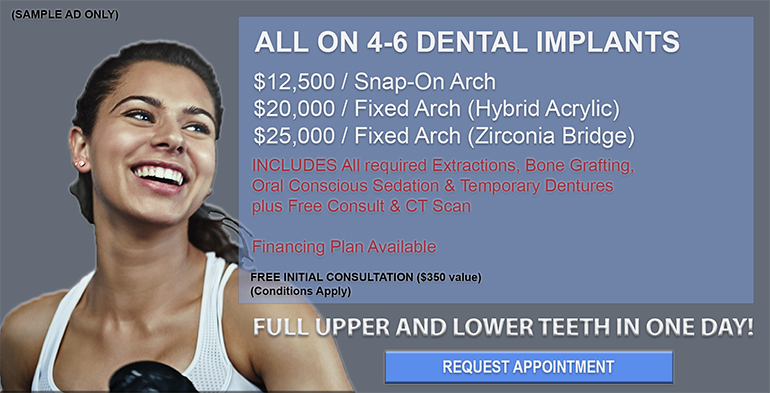
It’s important to read the fine print. This ad is only advertising half the cost of the All on 4 to 6 implant procedure. It excludes the implant abutments and placement of the full arch permanent teeth. You wouldn’t want to be budgeting for just half of the cost. Call your implant dentist and ask for the full cost from start to finish
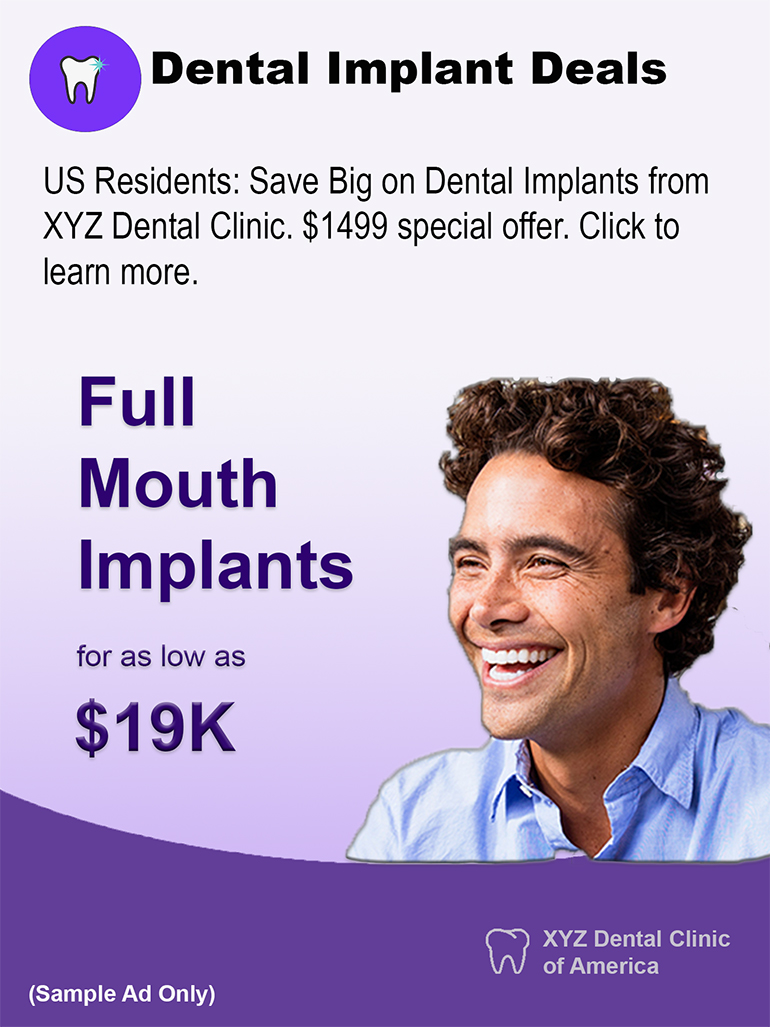
The term “as low as” often means entry-level in dentistry. It could mean the cheapest materials or procedure, generic brand implants, or it could be the minimum number of dental implants per jaw. Often, you’ll be presented with “upgrades” for better implant brands, more implants per arch, or better full-arch teeth materials. Of course, the “upgrades” are more expensive. The important thing is to invest in good materials and great teeth to ensure that your new set of teeth not only looks great but also lasts a long time.
Tip 4. Stick with Known Implant Brands
Ask your dentist about the brand, source, and stability of your manufacturer. Top dentists use top brands because they know that the implant design is one of the biggest contributors to the long-term maintenance and success of your tooth replacement.
Top dentists use two of the most popular brands such as Straumann and Nobel Biocare. Of course, there are hundreds of alternative brands. Some are generic brands, but many have unique configurations and designs.
Note that in some brands, you may have a hard time finding parts in the future if that implant brand goes out of business. The truth is, sometimes abutments and crowns need to be replaced, and if you can’t find compatible parts, you may be left with a titanium screw in your jaw that can’t be used.
Here’s an extra tip that will save you thousands and a lot of headaches in the future:
Get the specifications of your dental implant post right after the surgery in written form. The types of info you need are size, diameter, brand, and whether it’s internal or external hex.
Why? If your implant crown breaks ten or fifteen years down the road, your dentist will need to order a new connector (abutment) that will fit your implant. This might not be possible for certain brands if you don’t know your exact implant specs.
Tip 5. Ask for Guarantees
Guarantees on dental implant procedures might be difficult to get. It’s surgery after all, and a lot of things are not in the dental surgeon’s control. Maybe your body will reject the titanium screw, or perhaps you didn’t take the proper steps to take care of yourself after the surgery.
However, dentists still have a big responsibility for such treatments. What matters is what they will do if something goes wrong.
So, there is nothing wrong with asking your dentist to guarantee the dental implant procedure, at least for the first 6 to 12 months. Most implant failures happen within that time frame, so this is a useful guarantee.
At Blyss Dental, we guarantee your dental implant work for 5 years to protect your big investment in your oral health.
Tip 6. Avoid Paying Upfront for Everything
Paying upfront is a common complaint from patients (as discussed in Part 1, Common Complaint 4). Patients may get trapped in treatment after paying the full amount even before the treatment begins.
At Blyss Dental, we advise our patients to only pay for the procedures done in each stage of the treatment plan. Pay as you go, especially for dental implants which are completed in stages that are months apart.
Tip 7. Choose a Dental Practice That is Transparent on Pricing
Did you know that many countries – such as the UK – require dentists to post all their dental fees on their websites by law? Some countries also control the price a dentist can charge for a procedure.
We don’t have such regulations in the US. There is no regulation on dental fees and they are often not transparent. Dentists can set their own prices in an open market style without limitations.
There is no standard pricing for dental implants. The prices are not readily available online, making it difficult to shop around. Patients sometimes get sticker shock with the pricing of dental implants, especially for full mouth implants which can amount to the price of a brand-new car.
That is why it is very important to look for a dental practice that provides transparent pricing on all treatments.
Blyss Dental is one of the few dental practices that post our prices online. We call it Radically Transparent Pricing. We post all our prices online to make it easier for patients like you to compute the total cost of your treatment from start to finish.
Conclusion
We hope that through this article, we’ve shed light on how dental implants are priced and helped you become a savvy consumer. Saving up to $20,000 can make a big impact on your finances.
Hopefully, this article has also helped you compare the cost of dental implants in San Diego or Del Mar. We want to prepare you, mentally and financially, before diving into the treatment.
We at Blyss Dental want you to have informed decisions on a major procedure such as dental implants. As we always say, “We are with you every step of the way.”
To know more about our dental implant cost and other services, make sure to book your free consultation with us.


